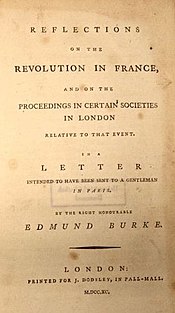Portal:Conservatism/Selected picture/8
Reflections on the Revolution in France (1790), by Edmund Burke, is one of the best-known intellectual attacks against the (then-infant) French Revolution. In the twentieth century, it much influenced conservative and classical liberal intellectuals, who recast Burke's Whig arguments as a critique of Communism and Socialist revolutionary programmes.
Edmund Burke served in the British House of Commons, representing the Whig party, in close alliance with liberal politician Lord Rockingham. In Burke's political career, he vigorously defended constitutional limitation of the Crown's authority, denounced the religious persecution of Catholics in his native Ireland, voiced the grievances of Britain's American colonies, supported the American Revolution, and vigorously pursued impeachment of Warren Hastings, the governor-general of Bengal, for corruption and abuse of power.
In 1789, soon after the fall of the Bastille, the French aristocrat Charles-Jean-François Depont asked his impressions of the Revolution; Burke replied with two letters. The longer, second letter became Reflections on the Revolution in France, published in 1790.
Credit: Awadewit

